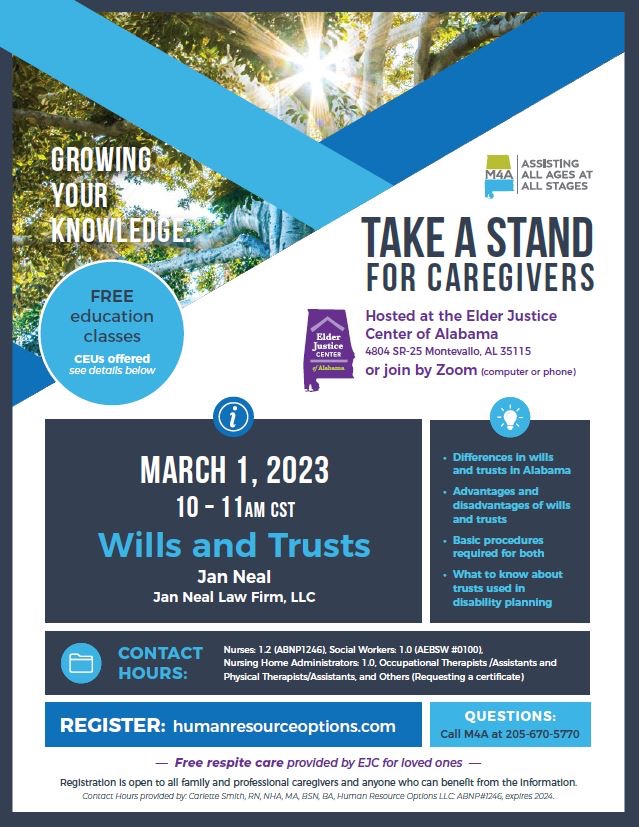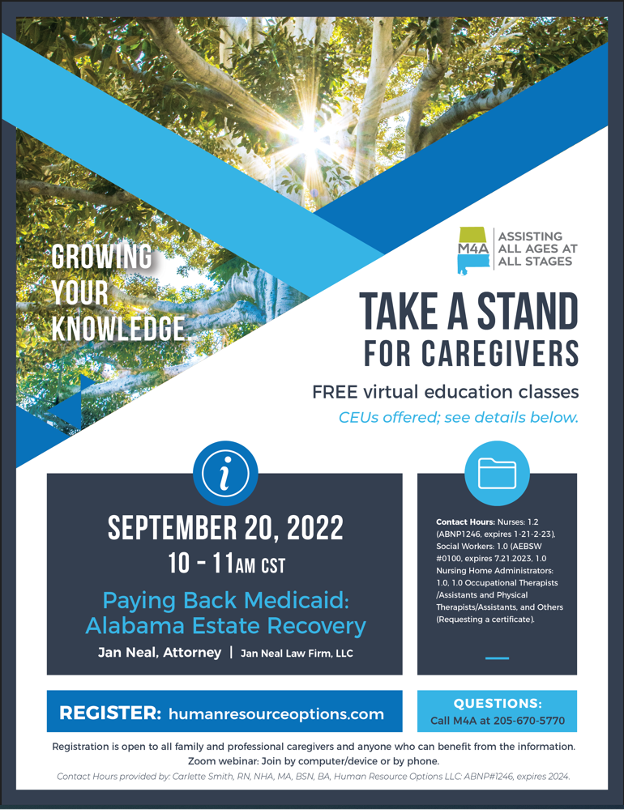Here is the updated presentation for Alabama Wills and Trusts provide in a seminar yesterday.
Category Archives: Uncategorized
Upcoming Training on Wills and Trusts in Alabama

I will be providing online training on March 1, 2023, at 10:00 a.m. CDT for Middle Alabama Area Agency on Aging’s Take a Stand For Caregivers initiative. There is no cost for attending, and while some professionals can receive continuing education credit, registration is available for anyone who can benefit from the information. Hope to see you there.
2023 Guidelines for Protecting Spouses of Medicaid Applicants
The Centers for Medicare & Medicaid Services (CMS) has released the 2023 federal guidelines for how much money the spouse of an institutionalized Medicaid recipient may keep to protect himself or herself when a spouse enters a nursing home and qualifies for Medicaid.
What Are Spousal Impoverishment Rules?
Spousal impoverishment is a concern for couples when there is one spouse who requires long-term care and applies for Medicaid. Before the federal government enacted spousal impoverishment protections, many healthy spouses faced poverty when their partners needed long-term care. The spousal impoverishment rules are based on the idea that spouses will provide for each other.
Community Spouse Resource Allowance
In 2023, the spouse of a Medicaid recipient living in a nursing home who is living at home (called the “community spouse”) may keep as much as $148,620 without jeopardizing the Medicaid eligibility of the spouse who is receiving long-term care. That is an increase from 2022’s cap at $137,400.
Known as the community spouse resource allowance (CSRA), this is the most that a state may allow a community spouse to retain without a hearing or a court order. While some states set a lower maximum, the least that a state may allow a community spouse to retain in 2023 will be $29,724. That amount is up from 2022’s $27,480.
Monthly Maintenance Needs Allowance
Meanwhile, the maximum monthly maintenance needs allowance (MMMNA) for 2023 will be $3,715.50 (up from $$2289 in 2022). This is the amount of monthly income that a community spouse can bring his or her income up to by routing some of the institutionalize spouse’s income home for the use of the community spouse. That number will not go into effect until July 1, 2023.
According to Medicaid law, the community spouse may keep all their own income, even if it exceeds the maximum monthly maintenance needs allowance.
The new spousal impoverishment numbers (except for the minimum monthly maintenance needs allowance) take effect on January 1, 2023.
Home Equity Limits
In 2023, a Medicaid applicant’s principal residence will not be counted as an asset by Medicaid if the applicant’s equity interest in the home is less than $688,000. States have the option of raising this limit to $1,033,000. In 2022 that maximum equity interest limit is $955,000.
Beware Deceptive Marketing of Medicare Advantage Plans
Medicare Advantage Plans (MA) are a good fit for many people, while they may not be a good idea for others. I have no problem with Medicare Advantage, but I do have a problem with the deceptive ways these plans are marketed.
Earlier this year The Center for Medicare and Medicaid Services (CMS) revealed that from 2020 to 2021 the agency received double the complaints from Medicare eligible persons about private sector marketing of MA plans. These complaints launched a Senate Finance Committee majority staff inquiry in August 2022. The committee reviewed complaints from 14 states and found that Medicare eligible persons were being “inundated with aggressive marketing tactics as well as false and misleading information, such as:
Seniors shopping at their local grocery store are approached by insurance agents and asked to switch their Medicare coverage or MA plan.
Insurance agents selling new MA plans tell seniors that their doctors are covered by the new plans. Seniors who switch plans find out months later that their doctor is actually out-of-network, and they have to pay out-of-pocket to visit their doctor.
Seniors receive mailers that look like official business from a Federal agency, yet the mailer is a marketing prompt from an MA plan or its agent or broker.
An insurance agent calls seniors 20 times a day, attempting to convince them to switch their Medicare coverage.
Widespread television advertisements with celebrities claim that seniors are missing out on benefits, including higher Social Security payments, in order ot prompt seniors to call MA plan agent or broker hotlines.”
These deceptive Medicare Advantage marketing practices are especially pervasive during open enrollment (October 15 – December 7). The committee recommends that CMS warn seniors and people living with disabilities of the following:
“Warning 1: USE CAUTION IF CALLING A TV HELPLINE . The Federal Medicare program does not advertise MA plans or benefits on television. These so-called helplines will connect you with an agent or broker. That agent or broker does not have to tell you about all of your options in the Medicare program and does not have to ensure that your plan will meet your needs.
Warning 2: IF YOU THINK YOU HAVE BEEN ENROLLED IN A NEW PLAN THAT DOESN’T WORK FOR YOU, CALL 1-800-MEDICARE FOR HELP. Seniors and people living with disabilities can also get no-cost counseling from the local State Health Insurance Assistance Program (SHIP) or Senior Medicare Patrol (SMP office). In some situations you may be eligible for a special enrollment period to switch back into your original plan During the first three months of the year you can also change your enrollment.
Warning 3: BE CAREFUL WHAT YOU CLICK. Third-Party Marketing Organizations are using sneaky tactics to get your information and then sell your information to agents or brokers who can call you. When in doubt, don’t provide your information on unfamiliar websites or to unfamiliar people. The Medicare Call Center (1-800-MEDICARE) and your local State Health Insurance Assistance Program (SHIP) office can help you understand your Medicare choices and enroll in a plan that will meet
your needs.”
There are multiple policy recommendations made in this report including reinstating requirements over marketing MA plans that were loosened during the Trump Administration.
The full report, Deceptive Marketing Practices Flourish in Medicare Advantage, can give you good insight on how to protect yourself while shopping for the right Medicare coverage that meets your individual needs.
Do You Need a Will or a Trust?

I will be speaking on Wills and Trusts at the Shelby County Senior Health and Wellness Exhibition in Columbiana on 10/13/22 from 10:45 – 11:15. The event will be at the First Baptist Church of Columbiana, 208 N Main St, Columbiana 35051 from 9:30 – 1:00. After the presentation I will make available my slide presentation covering the pros and cons of wills vs. trusts on this web site, Facebook and our Slideshare Account.
Medicaid Estate Recovery Presentation
You can access the training presentation on Medicaid Estate Recovery in Alabama given today for the Middle Alabama Area Agency on Aging’s Take a Stand for Caregivers series at this web site. You can read or download the presentation.
Medicaid Estate Recovery Training

I will be providing training on Alabama Medicaid Estate Recovery on Tuesday, 09/20/22, at 10:00 a.m. Central time. If you feel like you could benefit from information on this topic be sure to register with the Middle Alabama Area Agency on Aging. Free CEUs are being offered for social workers, nursing home administrators, occupational therapists and physical therapists.
We will be examining how estate recovery works in Alabama, and who is at risk for losing property to repay benefits Medicaid pays on their behalf.
Medicaid Caregiver Child Transfer Exemption
When a person applies for Medicaid the agency looks back at transfers the applicant made during the previous five years to determine if any property was given away or transferred for less than the value assigned by Medicaid. If so, a transfer penalty is incurred, and that means Medicaid will not pay for care for a length of time based on how much was transferred.
There are some permissible transfers allowed by law resulting in no penalty being imposed. These include:
The home when a child under 21, blind or disabled lives there;
The home when a sibling with an equity interest was residing there for at least one year prior to the institutionalization;
The home when a son or daughter of such claimant who was residing in the applicant’s home for a period of at least two years immediately before the date of applicant’s admission to the medical institution or nursing facility, and who provided care to such claimant which permitted the applicant to reside at home rather than in an institution or facility (the caregiver exemption);
Transfers of money into a Special Needs Trust.
Looking more closely at the caregiver child exemption, you often see children who have lived with the parent for many years to keep them safe at home and out of a nursing home who are concerned about their own security when the parent applies for Medicaid. If the child can meet the caregiver child standard, the home can be transferred to him or her without penalty, but often there is debt on the home preventing a transfer. The lesson here is to pay off debt on the home as quickly as possible to be able to take advantage of the caregiver child permissible transfer.
If the transfer cannot be done, and the parent goes in a nursing home, the property counts as a resource. But if the parent receives Home and Community Based Services through Medicaid the house does not count as a resource until the parent dies. At that time Medicaid will claim what it paid for the parent through Medicaid Estate Recovery. The only good news here is the estate recovery can be delayed until the caregiver child no longer lives in the home.
Arranging to Pass Personal Property at Death
The person who makes a will is known as the testator. Rather than requiring the testator to list all of his individual pieces of personal property in a will, some states allow the person to make a list of personal property stating to whom each item should pass. Known as a personal property memorandum, the document is separate from the will but must be referenced in the will to be legally binding.
Alabama does not have a provision for this type of distribution, but there is a work-around.
A will may state that the personal representative has complete authority to distribute personal property. If the personal representative is highly trusted by the testator he or she may be given such a memorandum to follow for the distribution of personal property. It is important to recognize that the personal representative is not legally bound by this personal property memorandum, but where the testator has a high trust level, he may feel comfortable with such an arrangement.
Avoid The Ultimate Co-mingling of Assets

It is standard advice to avoid co-mingle property of an older relative with your own money because it may be necessary to prove what belongs to each. For instance, if your relative needs to apply for Medicaid it may be difficult to provide a clean trail of his or her assets and expenditures for five years prior to application as is required by Medicaid.
But the ultimate co-mingling is when families live on property owned by the older relative who never partitioned the property to deed individual parcels to the children or grandchildren. It is not unusual to see families who live and operate businesses off the property of an aging mother, father, or grandparent. This can provide a great family support system and work for all parties involved. Until it doesn’t.
If the aging parent becomes sick enough to need nursing home placement and there are not enough liquid resources to pay for that, then the property will need to be liquidated to provide income to pay for nursing home care or to spend down assets before qualifying for Medicaid. This leaves the relatives living on the property in a very precarious position.
If you are in this position, get legal advice now about what you can do to protect yourself and your aging relative before it becomes an emergency.
